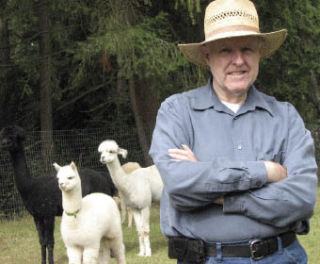When the farm boy in Robert McRae whispered in his ear, he suggested raising something entirely different on his green pastures.
Heeding that call transformed McCrae’s peaceful, 10-acre spread in bucolic east Auburn into a physically therapeutic and potentially money making venture.
Shunning retirement at 72, McRae keeps up his duties as the oldest emergency medical technician in the state. But in his spare time, the longtime Auburnite tends to a herd of Huacaya alpacas in the solitude of his farm, which sits on a cliff overlooking the splendid Green River, offering an imposing view of mighty Mount Rainier.
It is a comfortable setting for McRae and his wife, Carole, who have stepped outside their busy occupations to manage a livestock farm.
“It’s very relaxing and very different,” said Carole, a program manager for the state of Washington. “And they’re very sweet, very curious and very smart animals. They’re amazing creatures.”
Three years ago, the McRaes established Alpacas West – a moderately-sized operation that will market its first stock of soft fleeces this winter. The sought-after fleece – a lightweight, lustrous and silky natural fiber – is sheared once a year and eventually spun into yarn and other products.
“Like our slogan says, it’s for ‘Pleasure and Profit,’ “ McRae said. “Carole came up with that, and it really fits.
“We really enjoy it, and secondly, it does have a lot of profit potential and tax benefits.”
The Auburn couple doesn’t plan on making the farm any larger than what it has become. Their alpaca nation stands conveniently at 15, which is just manageable when it comes to the routine of daily feedings, cleaning the barns and carefully tending to other needs.
While it took a significant investment to establish a herd, the McRaes intend to make it work as owners, breeders, sellers and participants in the fiber market.
The growing alpaca industry is considered relatively new throughout the country, including Western Washington, which supports its share of farms, large and small.
As entrepreneurs and breeders, the McRaes have proven to be quick studies. They have maintained their careers while diving into the understanding and care of alpacas.
Three years in, they are still learning.
“We like it,” Robert said of the duties. “There are several aspects to it. You enjoy the animals. They have personalities, they’re individuals and, for the most part, they are quiet and happy.
“We also like the opportunity to be outside and physical,” he added. “It’s a structured activity because they do require daily care.”
Carole, for one, has had to research and observe the unique animal’s genetics and behaviors to properly match them for breeding, ensuring the sustainability and quality of the herd.
Carole – a city girl from Spokane – actually delivered the farm’s first cria, a newborn alpaca. No time to wait for the veterinarian to arrive, she followed the delivery procedure by the book.
That nerve-wracking episode produced a healthy boy.
“Afterward, the vet asked me if there was any oxygen deprivation (during the birth),” recalled Carole. “I said, ‘Yes, me.’”
Come spring, the farm is expecting to welcome four additions to the family.
Robert, who grew up on a small farm in Twin Falls, Idaho, gets occasional help from family to work the farm. But mostly, it’s up to the couple and their gentle ways to take care of the herd and run the business.
Each alpaca has a registered name, a personality and a bond with the McRaes. Each alpaca, cousin to the llama, can produce up to 10 pounds of luxurious fiber. The adults stand approximately 36 inches at the withers and generally weigh between 150 and 200 pounds. They are alert, curious and predictable.
There’s Coal Mine Black and Sterling Silver. There’s the three boys – Flash, Flame and Prince.
“They’re gentle and kind,” Carole said. “They look out for each other.”
As do the McRaes on a small farm in the countryside.
Celebrating National Alpaca Farm Days
Alpaca breeders from throughout the U.S. invite the public to come to their farms or ranches to meet their alpacas and learn more about the inquisitive, unique animals. More information is available at nationalalpacafarmdays.com
• When: Saturday, Sunday (10 a.m. to 3 p.m.)
• Where: Alpacas West, 16507 SE 352nd St., Auburn
• Program: Gift cards for the kids; show-and-tell of the animals; a name the baby boy contest at 2:30 p.m., with the winner receiving an iPod.
• Information, directions: www.alpacaswest.com, 253-735-2729


